Page 7 of 352 pages « First < 5 6 7 8 9 > Last »
Page of pamphlet concerning tea
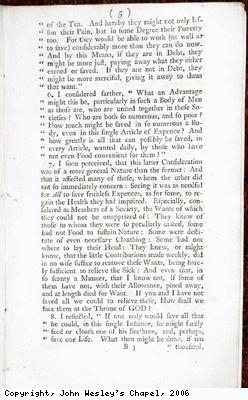
Description:
The New Room, John Wesley’s Chapel, Bristol. Founding date 1739.
Page of pamphlet – A letter to a friend concerning tea, 1768.
Wesley considered tea to be expensive, but fashion meant people were buying it who could not afford it.Wesley also considered it to be bad for the health.
John Wesley was the founder of the Methodist Church. He was an Abolitionist and a preacher, who wrote and preached against the slave trade.
Date: 1768
Copyright: Copyright, John Wesley's Chapel
Object ID:NR 2001.393
Page of pamphlet concerning tea
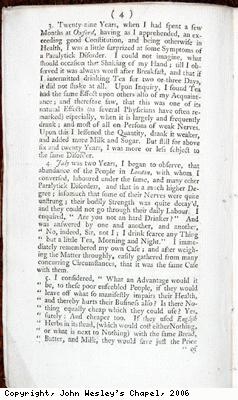
Description:
The New Room, John Wesley’s Chapel, Bristol. Founding date 1739.
Page of pamphlet – A letter to a friend concerning tea, 1768.
Wesley considered tea to be expensive, but fashion meant people were buying it who could not afford it.Wesley also considered it to be bad for the health.
John Wesley was the founder of the Methodist Church. He was an Abolitionist and a preacher, who wrote and preached against the slave trade.
Date: 1768
Copyright: Copyright The Society of Merchant Venturers
Object ID:NR 2001.393
Pamphlet concerning tea

Description:
The New Room, John Wesley’s Chapel, Bristol. Founding date 1739.
Front cover of pamphlet – A letter to a friend concerning tea, 1768.
Wesley considered tea to be expensive, but fashion meant people were buying it who could not afford it.Wesley also considered it to be bad for the health.
John Wesley was the founder of the Methodist Church. He was an Abolitionist and a preacher, who wrote and preached against the slave trade.
Date: 1768
Copyright: Copyright, John Wesley's Chapel
Object ID:NR 2001.393
Page of pamphlet concerning tea

Description:
The New Room, John Wesley’s Chapel, Bristol. Founding date 1739.
Page of pamphlet – A letter to a friend concerning tea, 1768.
Wesley considered tea to be expensive, but fashion meant people were buying it who could not afford it.Wesley also considered it to be bad for the health.
John Wesley was the founder of the Methodist Church. He was an Abolitionist and a preacher, who wrote and preached against the slave trade.
Date: 1768
Copyright: Copyright The Society of Merchant Venturers
Object ID:NR 2001.393
Muster roll
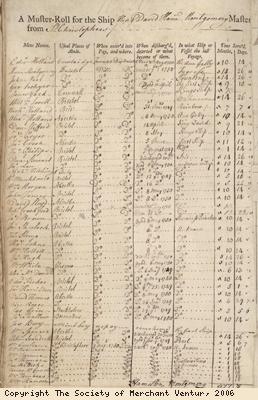
Description:
Ships’ muster rolls from 1750 – 1751; Society of Merchant Venturers’ archive.
Muster roll no: 20.
Muster roll for the ship, the King David, sailing from St Christophers, on St Kitts in the Caribbean 1749.
The King David sailed for the Bight of Benin, Africa, with instructions to buy 350 slaves. The actual number bought there and sold at St Kitts is not known. From the list, it seems that 20 of the crew died and several deserted before the ship reached St Kitts.
The muster roll is a list of all crew signed on for all or part of a voyage, which was used to calculate the money each man should pay to the Sailors’ Hospital Fund (insurance).
The Society of Merchant Venturers is a Bristol-based organisation, which was formed in 1552 as an elite body of merchants involved in overseas trade. The Society still exists today.
Date: 1749
Copyright: Copyright The Society of Merchant Venturers
Muster roll
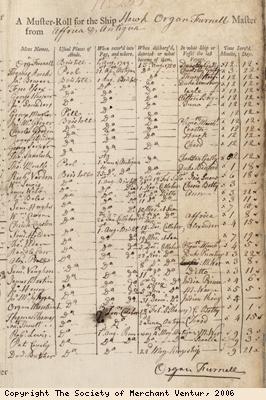
Description:
Ships’ muster rolls from 1748 – 1749; Society of Merchant Venturers’ archive.
Muster roll no: 235.
Muster roll for the ship, the Hawk, sailing from Africa and Antigua, 1749.
The Hawk sailed for Calabar, with instructions to buy 340 slaves. The number actually bought there and sold at Antigua is not known. Half of the crew of 28 seem to have died before the ship reached Antigua, in the Caribbean, most of them whilst the ship was at Calabar between November and January.
The muster roll is a list of all crew signed on for all or part of a voyage, which was used to calculate the money each man should pay to the Sailors’ Hospital Fund (insurance).
The Society of Merchant Venturers is a Bristol-based organisation, which was formed in 1552 as an elite body of merchants involved in overseas trade. The Society still exists today.
Date: 1749
Copyright: Copyright The Society of Merchant Venturers
Muster roll
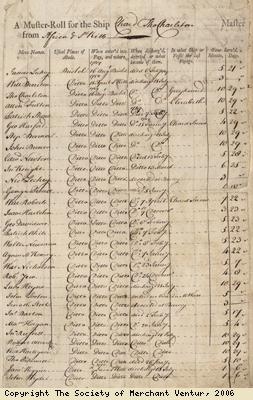
Description:
Ships’ muster rolls from 1750 – 1751; Society of Merchant Venturers’ archive.
Muster roll no: 19.
Muster roll for the ship, the Chard, sailing from Africa and St Kitts in the Caribbean, 1749.
The Chard, a small ship of 60 tons, sailed for the Bonny coast with instructions to buy 300 slaves. The actual number bought there and sold at St Kitts is not known.
The muster roll is a list of all crew signed on for all or part of a voyage, which was used to calculate the money each man should pay to the Sailors’ Hospital Fund (insurance).
The Society of Merchant Venturers is a Bristol-based organisation, which was formed in 1552 as an elite body of merchants involved in overseas trade. The Society still exists today.
Date: 1749
Copyright: Copyright The Society of Merchant Venturers
Muster roll
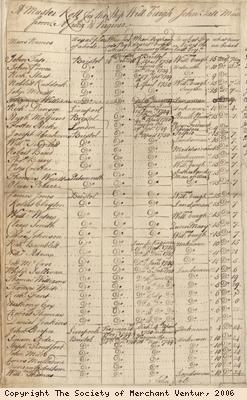
Description:
Ships’ muster rolls from 1748 – 1749; Society of Merchant Venturers’ archive.
Muster roll no: 204.
Muster roll for the ship, the Williamsburgh, sailing from Africa and Virginia USA, 1748.
The Williamsburgh sailed to Africa with instructions to buy 400 slaves. The actual number bought is not known, but 335 were sold at Virginia.
The muster roll is a list of all crew signed on for all or part of a voyage, which was used to calculate the money each man should pay to the Sailors’ Hospital Fund (insurance).
The Society of Merchant Venturers is a Bristol-based organisation, which was formed in 1552 as an elite body of merchants involved in overseas trade. The Society still exists today.
Date: 1748
Copyright: Copyright The Society of Merchant Venturers
Muster roll
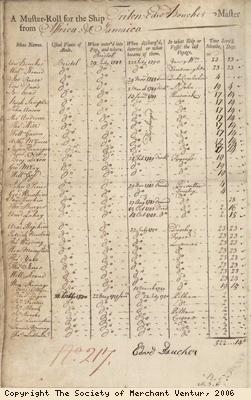
Description:
Ships’ muster rolls from 1748 – 1749; Society of Merchant Venturers’ archive.
Muster roll no: 217.
Muster roll for the ship, the Triton, sailing from Africa and Jamaica, 1748.
The Triton sailed for the Gold Coast in West Africa, with instructions to buy 360 slaves. The actual number bought and sold at Jamaica is not known.
The muster roll is a list of all crew signed on for all or part of a voyage, which was used to calculate the money each man should pay to the Sailors’ Hospital Fund (insurance).
The Society of Merchant Venturers is a Bristol-based organisation, which was formed in 1552 as an elite body of merchants involved in overseas trade. The Society still exists today.
Date: 1748
Copyright: Copyright The Society of Merchant Venturers
Muster roll
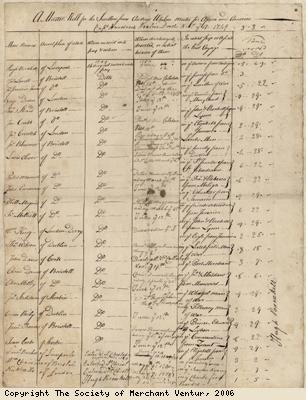
Description:
Ships’ muster rolls from 1748 – 1749; Society of Merchant Venturers’ archive.
Muster roll no: 188.
Muster roll for the ship, the Swallow, sailing for Africa and America, 1749.
Where the Swallow went in Africa, how many slaves were bought amd how many sold, is not known. This seems to be the only slaving voyage of this ship. The crew were from merchant vessels with no experience of slaving voyages, so perhaps the venture was not a success for the owners and was not repeated.
The muster roll is a list of all crew signed on for all or part of a voyage, which was used to calculate the money each man should pay to the Sailors’ Hospital Fund (insurance).
The Society of Merchant Venturers is a Bristol-based organisation, which was formed in 1552 as an elite body of merchants involved in overseas trade. The Society still exists today.
Date: 1749
Copyright: Copyright The Society of Merchant Venturers

